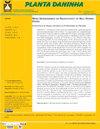Allelopathic Influence of Sorghum Aqueous Extracts and Sorghum Powder on Germination Indices and Seedling Vigor of Hybrid Corn and Jungle Rice
IF 0.8
Q3 Agricultural and Biological Sciences
引用次数: 2
Abstract
ABSTRACT: Allelopathy has become a paramount tool for controlling weeds in crop plants without deteriorating the environment. Allelopathic effects of sorghum aqueous extracts and sorghum powder on a single cross maize (Zea mays L.) hybrid “HC-8080” and a summer weed, jungle rice (Echinochloa colona L.) were assessed in the research laboratory of Agronomy, Faculty of Agriculture, Gomal University, Dera Ismail Khan, KPK, Pakistan. The treatments included: T1: control (untreated check), T2: sorghum aqueous extract at a rate of 5 mL kg-1 soil, T3: sorghum aqueous extract at a rate of 10 mL kg-1 soil, T4: sorghum aqueous extract at a rate of 15 mL kg-1 soil, T5: sorghum powder at a rate of 5 g kg-1 soil, T6: sorghum powder at a rate of 10 g kg-1 soil and T7: sorghum powder at a rate of 15 g kg-1 soil. The results unveiled that sorghum aqueous extract at a rate of 15 mL kg-1 soil was the most deleterious treatment which reduced the germination percentage (GP) in maize and E. colona by 23.57% and 47.03%, germination index (GI) by 22.30% and 42.14%, root length by 32.25% and 62.54% and shoot length by 23.22% and 62.76%, respectively over control. Similarly, 15 g kg-1 soil sorghum powder reduced the same parameters respectively by 18.85% and 41.09%, 15% and 33.53%, 9.3% and 54.69% and 15.88% and 45.34% in maize and E. colona, respectively and stood better than other powder treatments. Therefore it is concluded that sorghum extracts and powder can both be used to control weeds efficiently but their deleterious effect on the corresponding crop should also be an important consideration.高粱水提物和高粱粉化感作用对杂交玉米和丛林稻发芽指标和幼苗活力的影响
摘要:化感作用已成为作物在不破坏环境的前提下控制杂草的重要手段。在巴基斯坦德拉伊斯梅尔汗市戈马尔大学农学院农学研究实验室,研究了高粱水提物和高粱粉对单杂交玉米(Zea mays L.)杂交品种HC-8080和夏季杂草丛林稻(Echinochloa colona L.)的化感作用。这些处理包括:T1:对照(未经处理的对照),T2:高粱水浸液用量为5 mL kg-1土壤,T3:高粱水浸液用量为10 mL kg-1土壤,T4:高粱水浸液用量为15 mL kg-1土壤,T5:高粱粉用量为5 g kg-1土壤,T6:高粱粉用量为10 g kg-1土壤,T7:高粱粉用量为15 g kg-1土壤。结果表明,15 mL kg-1的高粱水提液处理对玉米和大肠杆菌的发芽率和发芽指数分别比对照降低23.57%和47.03%、22.30%和42.14%、根长分别降低32.25%和62.54%、茎长分别降低23.22%和62.76%,危害最大。15 g kg-1土壤高粱粉对玉米和大肠杆菌的影响分别降低18.85%和41.09%、15%和33.53%、9.3%和54.69%、15.88%和45.34%,均优于其他粉处理。因此,高粱提取物和高粱粉都可以有效地防治杂草,但对相应作物的有害影响也应予以重视。
本文章由计算机程序翻译,如有差异,请以英文原文为准。
求助全文
约1分钟内获得全文
求助全文
来源期刊

Planta Daninha
Agricultural and Biological Sciences-Plant Science
自引率
0.00%
发文量
0
审稿时长
16 weeks
期刊介绍:
Planta Daninha is a scientific journal published by the Brazilian Society of Weed Science (SBCPD - Sociedade Brasileira da Ciência das Plantas Daninhas). Papers submitted for publication must be sent through an electronic system, on http://www.scielo.br/pd. Works may be written in Portuguese, English, or Spanish, and will be accepted after being reviewed and approved by the Editorial Board. Only papers that have not been published or submitted for publication in other media will be accepted. Articles in Portuguese will be translated to English after being properly corrected and authorized by the authors. Planta Daninha has with goal to publish genuine technical-scientific papers and literature reviews from a critical perspective on Biology, weed management, and related topics.
 求助内容:
求助内容: 应助结果提醒方式:
应助结果提醒方式:


